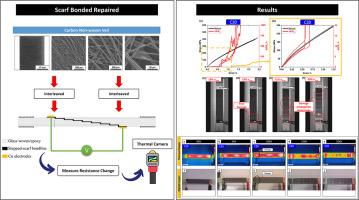用碳纤维无纺布纱交错粘接修复的玻璃/环氧层压板的结构健康监测
IF 5.3
Q2 MATERIALS SCIENCE, COMPOSITES
引用次数: 0
摘要
粘接修复补丁/接合点通常会在复合材料层压板中引入薄弱环节,使其成为结构健康监测(SHM)的主要候选对象。在这项研究中,使用玻璃纤维增强环氧树脂层压板作为代表性修复补丁,制造了阶梯式围巾粘接接头,并通过电阻变化法应用了一种新型 SHM 方法。为了在阶梯式围巾接合处内建立导电路径,沿着阶梯式粘合线交错铺设了面积重量分别为 10 克/平方米和 20 克/平方米的无纺碳纤维纱。进行了两种拉伸试验。在第一组试验中,阶梯形碳纤维纱接头承受单调的准静态拉伸负荷,直至粘合线完全断裂(灾难性破坏),并持续监测电阻的变化。与未使用碳纱的接头相比,使用 10 克/平方米碳纱的接头的破坏应力仅略有下降(∼2%),而使用 20 克/平方米碳纤维无纺布的接头的破坏应力则大幅下降(∼9%)。然而,使用 10 克/平方米和 20 克/平方米碳纱的接合处的电阻发生了显著变化(分别为 ∼200 % 和 ∼1000 %,直至完全失效)。同时,在测试期间拍摄的数字图像的支持下,电阻的变化被用于检测损坏的开始和发展。在第二组测试中,对接头进行周期性拉伸加载/卸载,并监测电阻的变化。在卸载阶段,观察到电阻发生了显著的永久性变化(在带有 20 g/m² 薄膜的粘合线中高达 120%),为了解层压板和粘合线的损坏演变提供了依据。此外,在循环拉伸试验中用焦耳加热法获得的热图像也用于确认电阻变化法检测到的损伤。此外,断裂表面的显微照片表明,电阻变化的主要原因是碳纱内部或附近发生的损坏。总之,研究结果表明,所介绍的 SHM 方法在非导电层压复合材料中加入了碳无纺布纤维纱,有望监测修复后的复合材料层压板以及粘合复合材料层压板接合处的损伤发生和扩展情况,同时不会对粘合线的结构完整性产生不利影响。本文章由计算机程序翻译,如有差异,请以英文原文为准。

Structural health monitoring of scarf bonded repaired glass/epoxy laminates interleaved with carbon non-woven veil
Bonded repair patches/joints often introduce vulnerabilities in composite laminates, making them prime candidates for structural health monitoring (SHM). In this study, stepped-scarf bonded joints were manufactured using glass fibre-reinforced epoxy laminates as representative repair patches, and a novel SHM approach through the electrical resistance change method was applied. To establish an electrically conductive path within the stepped-scarf joint, non-woven carbon fibre veils with areal weights of 10 g/m² and 20 g/m² were interlaid along the stepped bondline. Two types of tensile tests were performed. In the first set of tests, the stepped-scarf joints underwent monotonic quasi-static tensile loading until the bondline was completely fractured (catastrophic failure) and the change in electrical resistance was continuously monitored. The failure stress of the joint with a 10 g/ m² carbon veil was only marginally decreased (∼2 %) in comparison with that of the joints without a carbon veil, while the failure stress of the joint with a 20 g/m² carbon non-woven veil was considerably decreased (by ∼9 %). However, the joints with 10 g/m² and 20 g/m² carbon veils exhibited a significant change in electrical resistance (∼200 % and ∼1000 %, up to full failure, respectively). Simultaneously, the change in electrical resistance was used for the detection of damage initiation and progression, supported by digital images taken during the tests. In the second set of tests, the joints were subjected to a cyclic tensile loading/unloading regime and the change in electrical resistance was monitored. A significant amount of permanent change in resistance during the unloading phases (up to 120 % in the bondline with a 20 g/m² veil) was observed, providing insights into the laminate and bondline damage evolution. In addition, thermal images obtained with the joule heating method in the cyclic tensile tests were used to confirm the damage detected with the electrical resistance change method. Moreover, the micrographs from the fracture surfaces indicated that the variations in electrical resistance change are largely caused by damage occurring within or near the carbon veils. In conclusion, the results demonstrate that the presented SHM approach, which incorporates carbon non-woven fibre veils within non-conductive laminate composites, holds promise for monitoring damage initiation and propagation in repaired composite laminates as well as adhesively bonded composite laminate joints, without adversely influencing the structural integrity of the bondline.
求助全文
通过发布文献求助,成功后即可免费获取论文全文。
去求助
来源期刊

Composites Part C Open Access
Engineering-Mechanical Engineering
CiteScore
8.60
自引率
2.40%
发文量
96
审稿时长
55 days
 求助内容:
求助内容: 应助结果提醒方式:
应助结果提醒方式:


